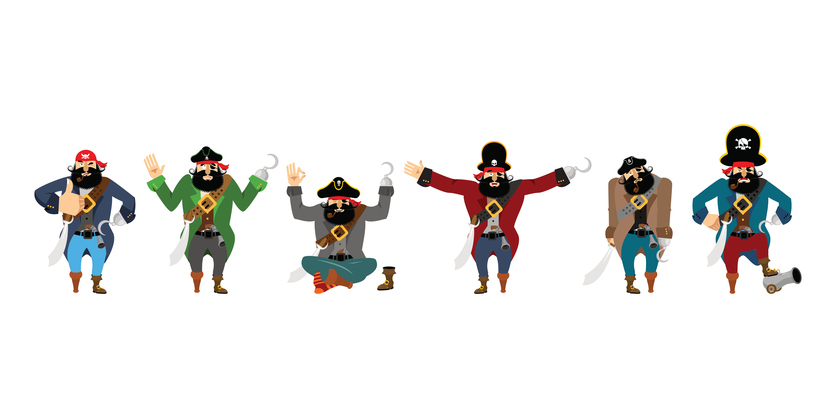Today is International Talk Like a Pirate Day! Or, should you know of those scourges of the sea by a different name, International Talk Like a Buccaneer Day. There have been lots of different words throughout history synonymous with pirates, and here’s a little bit about their origins. Or rather, arrrrrr-igins.
Buccaneer
Pirates, as the name of a popular ride and movie series tell us, like to rummage about the Caribbean, so it’s interesting that the buccaneer has its origin near the islands. Some of the people who lived there had a word in the local language (Caribbean Arawak): buccan, which referred to a wooden frame on which manatee meat was roasted over a fire. French explorers in the area adopted the word into their language, where it became boucane, which means “to smoke.” From that, English speakers developed boucanier, to refer to French denizens of the islands who used those frames to roast and smoked the meat of wild animals. Since they had to hunt those critters, boucanier came to mean “hunter,” and in American English, the word evolved into buccaneer.
Privateers
These kinds of pirates loot enemy ships on behalf of a government entity. In other words, they’re “private” contractors.
Corsair
A corsair is merely a privateer aligned with the French government (which explains the French-sounding word). These pirates-for-hire worked on behalf of the French crown, boarding and raiding ships they came across that happened to fly the flag of a nation that happened to be at war with France. Corsair ships were officially licensed by the French government, given a legal document called a Lettre de Course. From “course,” of course, is where corsair comes from. It’s derived from the Latin word cursus, and literally means “one who journeys.”
Marauder
Before the major age of piracy in the 1700s and 1800s, some form of marauder had already been a part of the French language for a couple hundred of years. It’s a version of the Middle French term maraud, which means “rogue” or “vagabond”…both of which would describe pirates pretty well, so that definition more or less took over the word.
Pirate
Many (if not most) major European languages derive from a language that linguists call Proto-Indo-European, which dates to about 4500 B.C. One term from that system that made its way into numerous tongues was perya, which means “to attack.” It evolved into Greek as peirates, which means “a person who attacks ship,” and into Latin as pirata, meaning the same thing. The Spanish and Italian word for a ship assailant was also pirata, so it was a quick jump over to English as pirate.









